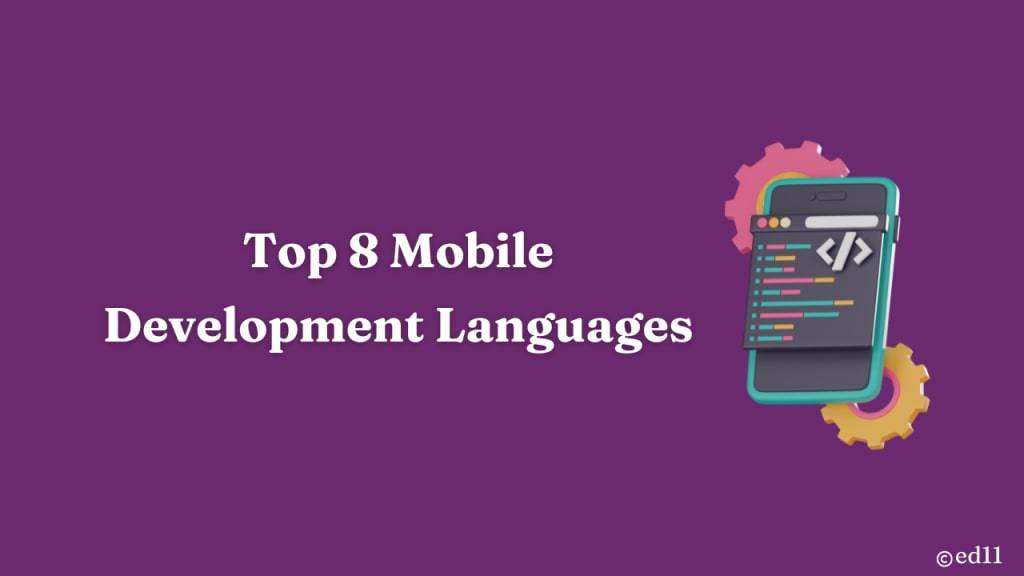As a Sr. DevOps Engineer, I know how important it is to choose the right tools for the job. Mobile development is no different. Picking the right mobile development language can make or break your project. Here, we will discuss the top 8 Mobile Development languages that dominate the industry today. Each of these languages has unique strengths and is suited for specific tasks.
What is Mobile Development Languages
Mobile development languages are the tools developers use to create apps for smartphones and tablets. These apps run on different operating systems like Android and iOS. Each operating system has its preferred languages, but some languages work for both. For Android apps, Java and Kotlin are popular choices. They let developers create apps that work smoothly on Android devices. For iOS apps, Swift and Objective-C are commonly used. Swift is easier to learn and is widely used for creating iPhone and iPad apps.
Benefits of Mobile Development Languages
Create Apps for Different Platforms: Mobile development languages like Swift, Kotlin, and Java allow developers to make apps for iOS and Android, reaching a wider audience.
Faster Development: These languages come with tools and libraries that help developers write code quickly and efficiently.
Better Performance: Languages like Swift and Kotlin are optimized for mobile devices, ensuring apps run smoothly without crashes or lags.
Custom Features: Mobile languages let developers create unique features, such as GPS tracking, camera functions, or offline access.
Strong Community Support: Popular mobile development languages have large communities where developers can find tutorials, forums, and help to solve problems.
Most Top 8 Mobile Development Languages
1. Java
Java is one of the oldest and most popular mobile development languages. Known for its reliability and robustness, it has been the backbone of Android development for years. With a vast library of pre-built modules and tools, Java allows developers to create complex applications efficiently. Many enterprises prefer Java because it is well-documented and has an active community for support.
Why Java?
- Strong object-oriented programming capabilities.
- Supported by Google for Android development.
- Extensive libraries and frameworks for mobile development.
2. Swift
Swift is Apple’s go-to programming language for iOS mobile development. This language is modern, easy to learn, and optimized for performance. Swift replaces Objective-C, offering a cleaner syntax and faster execution times. If you’re targeting Apple’s ecosystem, Swift is your best bet.
Why Swift?
- Designed specifically for iOS mobile development.
- Offers high speed and optimized performance.
- Supports safety features like error handling and memory management.
3. Kotlin
Kotlin is a powerful mobile development language that works seamlessly with Java. It’s officially supported by Google as an alternative for Android development. Many developers prefer Kotlin because it simplifies code, reducing boilerplate and making applications more efficient.
Why Kotlin?
- Fully interoperable with Java.
- Modern features like null safety and extension functions.
- Supported by a growing community of mobile developers.
4. JavaScript
JavaScript isn’t just for web development; it’s also a key player in mobile development. Frameworks like React Native and Apache Cordova use JavaScript to create cross-platform mobile apps. With JavaScript, you can write code once and deploy it to both iOS and Android.
Why JavaScript?
- Write once, run anywhere (cross-platform capability).
- Supported by powerful frameworks for mobile development.
- Familiar to developers with a web background.
5. Dart
Dart is gaining momentum in mobile development thanks to Flutter, Google’s UI toolkit for creating natively compiled applications. Dart’s syntax is easy to learn, making it a favorite among developers looking for fast prototyping and beautiful designs.
Why Dart?
- Powering Flutter, a leading cross-platform mobile development tool.
- Allows hot reloads for faster development.
- Optimized for both front-end and back-end tasks.
6. C#
C# is widely used in mobile development, especially for game development with Unity. It’s a versatile language supported by Microsoft and can be used to create apps for Android, iOS, and Windows. Its syntax is clean and beginner-friendly.
Why C#?
- Excellent for cross-platform mobile development with Xamarin.
- Strong support for game development.
- Supported by Microsoft with extensive documentation and tools.
7. Python
While Python is not traditionally a mobile development language, frameworks like Kivy and BeeWare have opened the door for its use in mobile app development. Python simplicity and readability make it a good choice for beginners exploring mobile development.
Why Python?
- Easy to learn and highly readable.
- Growing support for mobile frameworks.
- Ideal for prototyping and small-scale mobile applications.
8. Objective-C
Although Swift has largely replaced Objective-C, this language is still used in legacy iOS applications. It’s a reliable mobile development language with years of industry use. If you’re maintaining older iOS apps, you may need Objective-C.
Why Objective-C?
- Backward compatibility with older iOS systems.
- Extensive library support for iOS development.
- Supported by Apple’s development tools.
Choosing the right mobile development language depends on your project’s requirements, target platform, and the developer’s expertise. Whether you’re building a sleek iOS app with Swift, a robust Android app with Java or Kotlin, or a cross-platform app with JavaScript, each mobile development language offers unique advantages. As a Sr. DevOps Engineer, I’ve seen how the right language can streamline development, improve performance, and ensure long-term maintainability. These top 8 mobile development languages represent the best tools available today for creating cutting-edge applications. By staying updated on these mobile development languages, you can ensure your projects are built on a solid foundation and remain competitive in an ever-evolving industry.


